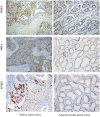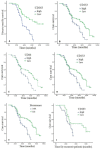High Infiltration of Polarized CD163+ Tumor-Associated Macrophages Correlates with Aberrant Expressions of CSCs Markers, and Predicts Prognosis in Patients with Recurrent Gastric Cancer
- PMID: 28261336
- PMCID: PMC5332886
- DOI: 10.7150/jca.16730
High Infiltration of Polarized CD163+ Tumor-Associated Macrophages Correlates with Aberrant Expressions of CSCs Markers, and Predicts Prognosis in Patients with Recurrent Gastric Cancer
Abstract
Background: As the most predominant tumor-infiltrating immune cells, tumor-associated macrophages (TAMs) are associated with poor outcome in multiple solid cancers and play important roles in cancer progression. Cancer stem cells (CSCs) may account for metastasis and recurrence after cancer therapy. However, the association between TAMs and CSCs is not clarified in gastric cancer (GC). The aim of the present study was to evaluate the effects of TAMs on CSCs in GC and find out the risk factors to predict recurrence and prognosis. Material and methods: This study included consecutive 236 patients with histologically confirmed primary GC. TAMs marker CD163 and CSCs-related proteins were detected by immunohistochemistry (IHC) in GC tissues and their prognostic values were all investigated. Results: High expression of CD163+ TAMs was found in patents with aggressive characteristics, especially for patents with recurrence. There existed a significant correlation between high expression of CD163 and CSCs-related markers in GC tissues. In patients with recurrence, high-expression of CD163 TAMs was an independent worse prognostic factor. Conclusion: High infiltration of TAMs was related to aggressive behavior, associated with aberrant expression of CSC markers, and an independent worse prognostic factor in GC. Targeting TAMs may be a potential treatment strategy for GC, including patients with recurrence.
Keywords: Cancer stem cells (CSCs); Gastric cancer; Prognosis.; Recurrent; Tumor-associated macrophages (TAMs).
Conflict of interest statement
Competing Interests: The authors have declared that no competing interest exists.
Figures



Similar articles
-
Hypoxia-inducible factor-1 alpha Correlates with Tumor-Associated Macrophages Infiltration, Influences Survival of Gastric Cancer Patients.J Cancer. 2017 Jul 2;8(10):1818-1825. doi: 10.7150/jca.19057. eCollection 2017. J Cancer. 2017. PMID: 28819379 Free PMC article.
-
Polarized CD163+ tumor-associated macrophages are associated with increased angiogenesis and CXCL12 expression in gastric cancer.Clin Res Hepatol Gastroenterol. 2016 Jun;40(3):357-365. doi: 10.1016/j.clinre.2015.09.005. Epub 2015 Oct 23. Clin Res Hepatol Gastroenterol. 2016. PMID: 26508473
-
Prognostic Implication of M2 Macrophages Are Determined by the Proportional Balance of Tumor Associated Macrophages and Tumor Infiltrating Lymphocytes in Microsatellite-Unstable Gastric Carcinoma.PLoS One. 2015 Dec 29;10(12):e0144192. doi: 10.1371/journal.pone.0144192. eCollection 2015. PLoS One. 2015. PMID: 26714314 Free PMC article.
-
Prognostic significance of tumor-associated macrophages in breast cancer: a meta-analysis of the literature.Oncotarget. 2017 May 2;8(18):30576-30586. doi: 10.18632/oncotarget.15736. Oncotarget. 2017. PMID: 28427165 Free PMC article. Review.
-
TAMs and PD-1 Networking in Gastric Cancer: A Review of the Literature.Cancers (Basel). 2023 Dec 30;16(1):196. doi: 10.3390/cancers16010196. Cancers (Basel). 2023. PMID: 38201623 Free PMC article. Review.
Cited by
-
miR-4262, low level of which predicts poor prognosis, targets proto-oncogene CD163 to suppress cell proliferation and invasion in gastric cancer.Onco Targets Ther. 2019 Jan 15;12:599-607. doi: 10.2147/OTT.S187881. eCollection 2019. Onco Targets Ther. 2019. PMID: 30697057 Free PMC article.
-
Gene expression profiles for a prognostic immunoscore in gastric cancer.Br J Surg. 2018 Sep;105(10):1338-1348. doi: 10.1002/bjs.10871. Epub 2018 Apr 25. Br J Surg. 2018. PMID: 29691839 Free PMC article.
-
Tumor Associated Macrophages, as the Dominant Immune Cells, Are an Indispensable Target for Immunologically Cold Tumor-Glioma Therapy?Front Cell Dev Biol. 2021 Jul 21;9:706286. doi: 10.3389/fcell.2021.706286. eCollection 2021. Front Cell Dev Biol. 2021. PMID: 34368156 Free PMC article. Review.
-
Modeling of the immune response in the pathogenesis of solid tumors and its prognostic significance.Cell Oncol (Dordr). 2020 Aug;43(4):539-575. doi: 10.1007/s13402-020-00519-3. Epub 2020 Jun 2. Cell Oncol (Dordr). 2020. PMID: 32488850 Free PMC article. Review.
-
Distribution pattern of tumor associated macrophages predicts the prognosis of gastric cancer.Oncotarget. 2017 Oct 6;8(54):92757-92769. doi: 10.18632/oncotarget.21575. eCollection 2017 Nov 3. Oncotarget. 2017. PMID: 29190953 Free PMC article.
References
-
- Torre LA, Bray F, Siegel RL. et al. Global cancer statistics, 2012. CA Cancer J Clin. 2015;65(2):87–108. - PubMed
-
- Chen W, Zheng R, Baade PD. et al. Cancer statistics in China, 2015. CA Cancer J Clin. 2016;66(2):115–32. - PubMed
-
- Sun YF. et al. Circulating stem cell-like epithelial cell adhesion molecule-positive tumor cells indicate poor prognosis of hepatocellular carcinoma after curative resection. Hepatology. 2013;57(4):1458–1468. - PubMed
LinkOut - more resources
Full Text Sources
Other Literature Sources
Research Materials
Miscellaneous

